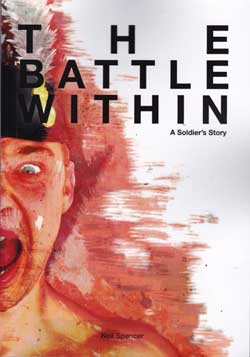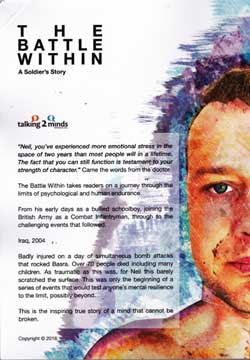
THE BATTLE WITHIN A Soldiers Story by Neil Spencer
Foreword by Jonathon Riley
View 'THE BATTLE WITHIN A Soldiers Story' Poster here »
 Foreword
Foreword
In many ways, Neil Spencer was a typical young Royal Welch Fusilier. Born in Newport, Gwent, always interested in joining the Army and once he had made a decision to do just that, the motivation changed his life for the better. Like many young lads he had not done as well as he might have done at school and worse, he had been bullied throughout his youth. However the determination to go for a military career was a turning point. He got fit – very fit – no more bullying and no more under-achieving. He sailed through recruit and infantry training. He could not get a place in the first regiment he chose, the Paras, through no fault of his own – the waiting list was just too long – so he joined the Royal Welch Fusiliers and there found plenty of others from his home town with whom he quickly settled in. His first year with the Regiment included fire-fighting duties, a three-month trip to Canada, a parachute course and specialist training. So far, so good – and not much different from the experience of a thousand others.
Then came another turning-point. The Regiment deployed to Iraq. Iraq was never a popular war: it brought about the biggest political demonstration in the history of our country; however popular support at home rallied behind the soldiers, if not behind the intervention. Initial Iraqi enthusiasm for liberation, however, soon turned into a series of insurgencies by former Ba’athists who had lost their status, by Iranian-backed Shi’ites and by Sunni extremists backed by Al-Qua’eda. These people attacked our soldiers by indirect means, chiefly roadside bombs – I.E.D.s – and suicide missions. It was one of the latter, a two-stage attack, that caused serious injury to Neil.
 The initial treatment in theatre, followed by his evacuation and follow-up surgery at home appears to have been dealt with speedily. He had the advantage of innovations in battlefield first aid that have saved lived which only ten years or so ago could well have been lost; and of the rapid reforms in hospital treatment for soldiers which came out of the scandalous mistreatment of wounded men and women early on in the Iraq war in NHS hospitals which simply were not geared up to deal with them in the way that our military hospitals were before they were closed down by Government. This is some good news, especially to me as I was then both Colonel of The Royal Welch Fusiliers and Commanding General in Iraq.
The initial treatment in theatre, followed by his evacuation and follow-up surgery at home appears to have been dealt with speedily. He had the advantage of innovations in battlefield first aid that have saved lived which only ten years or so ago could well have been lost; and of the rapid reforms in hospital treatment for soldiers which came out of the scandalous mistreatment of wounded men and women early on in the Iraq war in NHS hospitals which simply were not geared up to deal with them in the way that our military hospitals were before they were closed down by Government. This is some good news, especially to me as I was then both Colonel of The Royal Welch Fusiliers and Commanding General in Iraq.
It was from here on, however, that Neil’s difficulties accelerated. The story makes very uncomfortable reading for those charged with the care of our soldiers: he was, as he puts it himself, lost in the system and as a result received neither the timely physical treatment, nor the mental aftercare that he needed. The latter is less obvious but often goes deeper and it is the injury that no-one really wants to address: Governments of both colours seem happy to leave the matter largely in the hands of charities.
Why did this happen? Neil himself is not sure. I think that much has to do with the destruction of our traditional family Regiments, which was being perpetrated at that time. During that process, his Regimental family, who would under the old circumstances have kept a tight grip on him, lost him. The loss of our military hospitals must also surely be a part of this problem – no matter how good Selly Oak was at reconstructive surgery, or Headley Court and Tedworth House were and are at rehabilitation.
Happily, Neil has recovered and although, very sadly, his injuries were such that he had to leave the service, he has a decent life and a loving wife and family. Uncomfortable reading I said, but not whingeing. This book is not a whine, it is a wake-up call. Neil is a tough man, he never backed away from danger or problems but took them head on. He was damaged by his military service but I think he would say that overall, his military service made him a better person and we should avoid falling into the trap of believing that everyone who did military service is diminished by it. This is plainly not so, and Neil Spencer is a wonderful example of that truth, even though he endured more adversity than most can imagine.
Jonathon Riley
Lieutenant-General
Late The Royal Welch Fusiliers
'The Battle Within' is available from Amazon »